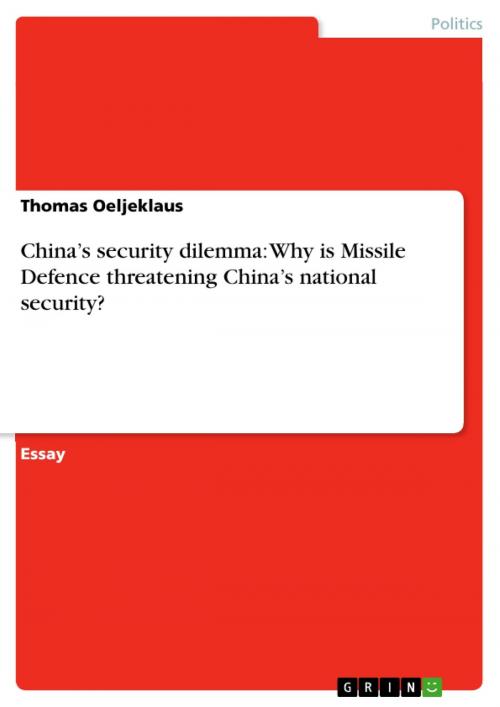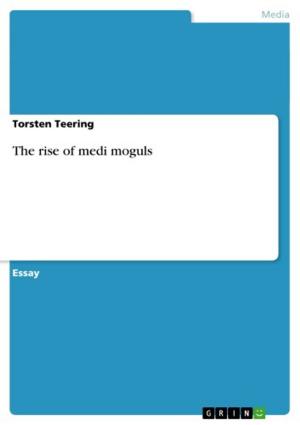China's security dilemma: Why is Missile Defence threatening China's national security?
Nonfiction, Social & Cultural Studies, Political Science, International, International Security| Author: | Thomas Oeljeklaus | ISBN: | 9783640426355 |
| Publisher: | GRIN Publishing | Publication: | September 14, 2009 |
| Imprint: | GRIN Publishing | Language: | English |
| Author: | Thomas Oeljeklaus |
| ISBN: | 9783640426355 |
| Publisher: | GRIN Publishing |
| Publication: | September 14, 2009 |
| Imprint: | GRIN Publishing |
| Language: | English |
Essay from the year 2008 in the subject Politics - International Politics - Topic: Peace and Conflict Studies, Security, grade: 1,3, University of Münster (Institut für Politikwissenschaft), course: Theater Missile Defense in Europe and Asia - A Comparison, language: English, abstract: Strengthening a country's defences should neither alarm its neighbours nor lead to an arms race. Despite this theoretical cognition of political sciences, the People's Republic of China sees Ballistic Missile Defence as a threat to its national security. The aim of this essay is to explain why the BMD systems of the USA are threatening China's national security. I will show that it is mainly a psychological discourse. Although, or precisely therefore, it is very important for the understanding of China's position and assumptions. We will understand that China faces a security dilemma which is threatening the national security and ultimately lead to an arms race. I will show that the technical aspects here are not as important as the psychological implications. Missile Defence 'hints at the psychological side of international politics.' The US's BMD systems may not work well enough to be technically a real threat to any country, but the development and instalment causes China's threat perceptions. BM is used 'as a saber-rattling show of force, for intimidation in order to reach a political goal or simply as deterrence against a perceived outside threat or imminent attack.' For the People's Republic of China there are two main issues: First, a period of strategic transition between the United States of America and the People's Republic of China and second, the US transfer of advanced PAC-3 Systems to Taiwan. 'The negative impact of missile defense deployments on Sino-US relations could potentially be reduced by offsetting them with political and economic measures to reassure China.' Chinas concerns about missile defence focus mainly on political questions. Thoughts, fears and perceptions of Chinese officials and experts focus on Japanese militarization, the possibility that TMD would encourage Taiwan's independence and the uncertainty about US intentions toward China. I will focus on the uncertainty about US intentions but I can't leave out the other two aspects totally. We will have a better understanding of the Chinese mind if we are aware of China's principle national priorities. On the one hand the Communist Party wants stay in power. For this reason they need social stability. On the other hand the economic development is very important for the country. It is the goal to have a continued economic growth. Additionally this plays in favour of social stability.
Essay from the year 2008 in the subject Politics - International Politics - Topic: Peace and Conflict Studies, Security, grade: 1,3, University of Münster (Institut für Politikwissenschaft), course: Theater Missile Defense in Europe and Asia - A Comparison, language: English, abstract: Strengthening a country's defences should neither alarm its neighbours nor lead to an arms race. Despite this theoretical cognition of political sciences, the People's Republic of China sees Ballistic Missile Defence as a threat to its national security. The aim of this essay is to explain why the BMD systems of the USA are threatening China's national security. I will show that it is mainly a psychological discourse. Although, or precisely therefore, it is very important for the understanding of China's position and assumptions. We will understand that China faces a security dilemma which is threatening the national security and ultimately lead to an arms race. I will show that the technical aspects here are not as important as the psychological implications. Missile Defence 'hints at the psychological side of international politics.' The US's BMD systems may not work well enough to be technically a real threat to any country, but the development and instalment causes China's threat perceptions. BM is used 'as a saber-rattling show of force, for intimidation in order to reach a political goal or simply as deterrence against a perceived outside threat or imminent attack.' For the People's Republic of China there are two main issues: First, a period of strategic transition between the United States of America and the People's Republic of China and second, the US transfer of advanced PAC-3 Systems to Taiwan. 'The negative impact of missile defense deployments on Sino-US relations could potentially be reduced by offsetting them with political and economic measures to reassure China.' Chinas concerns about missile defence focus mainly on political questions. Thoughts, fears and perceptions of Chinese officials and experts focus on Japanese militarization, the possibility that TMD would encourage Taiwan's independence and the uncertainty about US intentions toward China. I will focus on the uncertainty about US intentions but I can't leave out the other two aspects totally. We will have a better understanding of the Chinese mind if we are aware of China's principle national priorities. On the one hand the Communist Party wants stay in power. For this reason they need social stability. On the other hand the economic development is very important for the country. It is the goal to have a continued economic growth. Additionally this plays in favour of social stability.















